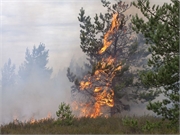Risk further increased for individuals with lower socioeconomic status
WEDNESDAY, April 15, 2020 (HealthDay News) — Risk for out-of-hospital cardiac arrest increases by 70 percent with exposure to heavy wildfire smoke, according to a study published online April 15 in the Journal of the American Heart Association.
Caitlin G. Jones, from the California Department of Public Health in Richmond, and colleagues examined the association between out-of-hospital cardiac arrest and wildfire smoke density determined using data from the National Oceanic Atmospheric Association Hazard Mapping System. The analysis included out-of-hospital cardiac arrest data for 5,336 individuals identified through the Cardiac Arrest Registry to Enhance Survival for 14 California counties (2015 to 2017).
The researchers found that out-of-hospital cardiac arrest risk increased in association with heavy smoke across multiple lag days, with the association strongest on lag day 2 (odds ratio, 1.70). Among individuals in the lower socioeconomic-status strata, risk was elevated, but not significantly, on medium and heavy days. For those with higher socioeconomic-status strata, elevated odds ratios were only seen with heavy smoke, not light and medium smoke. For days with heavy smoke, risk was increased for both sexes and age groups ≥35 years.
“The future trajectory of wildfire, along with increasing vulnerability of the aging population, underscores the importance of formulating public health and clinical strategies to protect those most vulnerable,” the authors write.
Copyright © 2020 HealthDay. All rights reserved.








